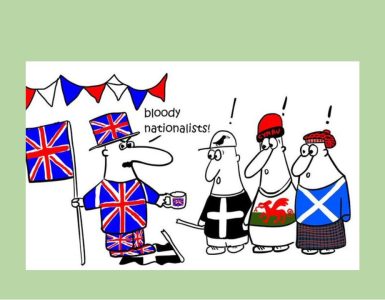Hi there M…
You sent me a couple of suggestions not long ago about the pursuit of Scottish independence and how it might be improved. Improved that is from your point of view as an Englishwoman who doesn’t support Scottish independence. So I thought it was worthwhile thinking through what you suggested.
Your suggestion: A referendum should include ex-pats, enabling a true consensus.
Let’s agree on terminology. An ex-pat is a person who has chosen to live and work in a country other than the one they were born in. So you’re suggesting that everyone born in Scotland, whether living there or not, should be eligible to vote in the next independence referendum. And you add that this would “enable a true consensus“.
My first thought is that all the Scottish ex-pats that I know would vote Yes. But you say that your Scots ex-pat pals would all vote No. Clearly we’ve got a different friend set! But seems to me that ex-pat Scots are – on average – as likely to be split about independence as those of us are who choose to live and work in Scotland.
My second – more important – thought is that your suggestion is based on a definition of nationality & citizenship that is different from how Scots think about those things. Your suggestion reflects the view that where you’re born determines your nationality. That’s a fairly common view in England.
But in Scotland, we put priority on where someone chooses to live and work. If a person chooses to live and work in Scotland then as far as we’re concerned they are Scots. We want citizens of other countries who live in Scotland and asylum seekers with right to remain to be able to vote in Scottish elections.
Scottish Voting Eligibility
And in fact those voting rights were passed into Scots Law by Holyrood. Ninety-two MSPs voted for The Scottish Election (Franchise & Representation Bill). Twenty-seven voted against. It became law in April 2020. And now anyone who has a legal right to live in Scotland can now vote in Scotland. It also allows prisoners serving sentences of 12 months or less to vote.
People born here who choose to live and work elsewhere are Scots by birth, and in many case by strong emotional ties too. But they are not entitled to vote here because of that. Voting rights are inextricably tied up with residency.
There’s Citizenship. There’s Residency. And there’s also age.
As an example, I’m eligible to become an Irish Citizen by descent because my grandad was born in on the island of Ireland. But if I did take that up – and it would make me an EU citizen again – I would not be eligible to vote in any Irish elections, including referendums, because I’m not resident there. To be eligible for inclusion in the Irish Register of Electors, you must:
- Be at least 18 years old on the day the Register comes into force (15 February). You can add your name to the draft Register before you turn 18.
- Have been ordinarily resident in the State on 1 September in the year before the Register comes into force.
Residency is also a required voting stipulation in all the different parts of UK.
| Elections based in .. | Voting Age | Required to be Resident? | Required to be Born in State? | Required to be Citizen of the State? |
| Scotland | 16 | Yes | No | All legally resident foreign nationals can vote |
| Eire | 18 | Yes, for minimum 18months | No | Irish, EU, or UK Citizens can vote |
| Wales | 16 | Yes | No | All legally resident foreign nationals can vote |
| UK | 18 | Yes | No | UK, Ireland,or Qualifying Commonwealth Citizens can vote |
But where a person was born doesn’t have any significance at all in the above table. Your country of birth doesn’t confer on you a right to vote in that county. Nor does it stop you voting elsewhere.
I rest my case, m’lud. My daughter, born in here but now living in England, can’t vote in Scotland. My husband, born in England but living in here, votes here but not in England.
I’ll get back to you about true consensus you mentioned…..






